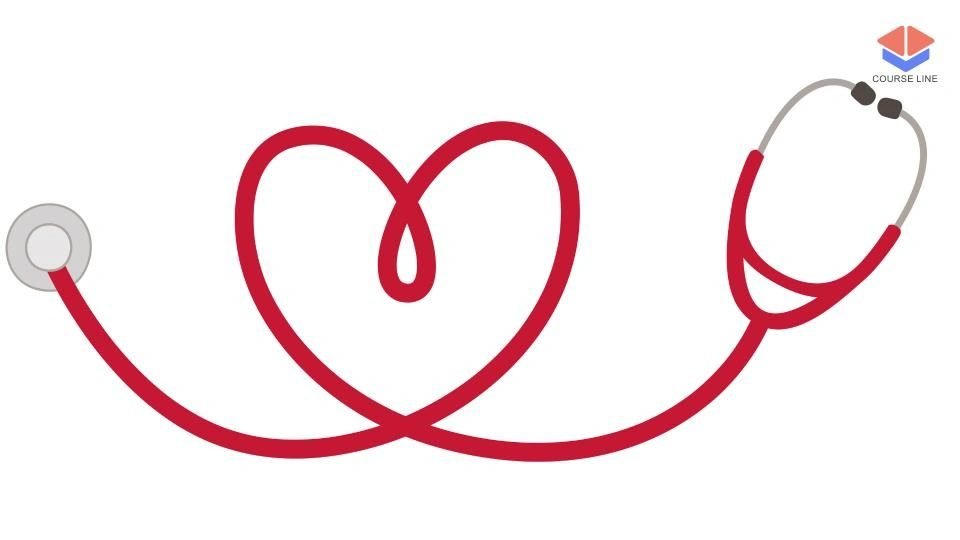Course Features
Price
Study Method
Online | Self-paced
Course Format
Reading Material - PDF, article
Duration
6 hours, 25 minutes
Qualification
No formal qualification
Certificate
At completion
Additional info
Coming soon
- Share
Overview
The Cardiology Level 3 Advanced Diploma is designed for individuals who aspire to gain in-depth knowledge of the cardiovascular system, including its anatomy, physiology, common diseases, and disorders. The course begins with a solid foundation in the structure and function of the heart, the circulatory system, and the cardiac conduction system. Students will also study the essential aspects of blood flow, hemodynamics, and the mechanisms behind cardiovascular conditions.
As the course progresses, learners will explore cardiovascular pathophysiology, including prevalent disorders such as atherosclerosis, hypertension, heart failure, and cardiomyopathies. Diagnostic techniques are a core focus, where students will learn how to use technologies like electrocardiography (ECG/EKG), echocardiography, stress testing, and cardiac catheterization to identify and monitor cardiovascular conditions.
Pharmacological treatments are also covered extensively. Students will gain knowledge of medications commonly prescribed for heart conditions, including antiarrhythmic drugs, anticoagulants, and antiplatelet agents, along with strategies for managing cardiovascular risk factors. Interventional cardiology is a significant portion of the curriculum, focusing on coronary artery disease interventions, pacemakers, and implantable cardioverter-defibrillators (ICDs).
The course further delves into cardiac rehabilitation, patient care, and the psychological aspects of managing heart conditions. Learners will understand the importance of lifestyle modifications and patient education in improving cardiovascular health. The final section of the course explores recent advancements in cardiology, ongoing research, and evidence-based practices that are shaping the future of heart disease management.
Throughout the program, students will learn valuable communication skills, gain insights into interdisciplinary collaboration, and become familiar with ethical and legal considerations in cardiology practice, preparing them for a fulfilling career in the field.
Who is this course for?
The Cardiology Level 3 Advanced Diploma is designed for individuals who aspire to gain in-depth knowledge of the cardiovascular system, including its anatomy, physiology, common diseases, and disorders. The course begins with a solid foundation in the structure and function of the heart, the circulatory system, and the cardiac conduction system. Students will also study the essential aspects of blood flow, hemodynamics, and the mechanisms behind cardiovascular conditions.
As the course progresses, learners will explore cardiovascular pathophysiology, including prevalent disorders such as atherosclerosis, hypertension, heart failure, and cardiomyopathies. Diagnostic techniques are a core focus, where students will learn how to use technologies like electrocardiography (ECG/EKG), echocardiography, stress testing, and cardiac catheterization to identify and monitor cardiovascular conditions.
Pharmacological treatments are also covered extensively. Students will gain knowledge of medications commonly prescribed for heart conditions, including antiarrhythmic drugs, anticoagulants, and antiplatelet agents, along with strategies for managing cardiovascular risk factors. Interventional cardiology is a significant portion of the curriculum, focusing on coronary artery disease interventions, pacemakers, and implantable cardioverter-defibrillators (ICDs).
The course further delves into cardiac rehabilitation, patient care, and the psychological aspects of managing heart conditions. Learners will understand the importance of lifestyle modifications and patient education in improving cardiovascular health. The final section of the course explores recent advancements in cardiology, ongoing research, and evidence-based practices that are shaping the future of heart disease management.
Throughout the program, students will learn valuable communication skills, gain insights into interdisciplinary collaboration, and become familiar with ethical and legal considerations in cardiology practice, preparing them for a fulfilling career in the field.
Requirements
The Cardiology Level 3 Advanced Diploma is designed for individuals who aspire to gain in-depth knowledge of the cardiovascular system, including its anatomy, physiology, common diseases, and disorders. The course begins with a solid foundation in the structure and function of the heart, the circulatory system, and the cardiac conduction system. Students will also study the essential aspects of blood flow, hemodynamics, and the mechanisms behind cardiovascular conditions.
As the course progresses, learners will explore cardiovascular pathophysiology, including prevalent disorders such as atherosclerosis, hypertension, heart failure, and cardiomyopathies. Diagnostic techniques are a core focus, where students will learn how to use technologies like electrocardiography (ECG/EKG), echocardiography, stress testing, and cardiac catheterization to identify and monitor cardiovascular conditions.
Pharmacological treatments are also covered extensively. Students will gain knowledge of medications commonly prescribed for heart conditions, including antiarrhythmic drugs, anticoagulants, and antiplatelet agents, along with strategies for managing cardiovascular risk factors. Interventional cardiology is a significant portion of the curriculum, focusing on coronary artery disease interventions, pacemakers, and implantable cardioverter-defibrillators (ICDs).
The course further delves into cardiac rehabilitation, patient care, and the psychological aspects of managing heart conditions. Learners will understand the importance of lifestyle modifications and patient education in improving cardiovascular health. The final section of the course explores recent advancements in cardiology, ongoing research, and evidence-based practices that are shaping the future of heart disease management.
Throughout the program, students will learn valuable communication skills, gain insights into interdisciplinary collaboration, and become familiar with ethical and legal considerations in cardiology practice, preparing them for a fulfilling career in the field.
Career path
The Cardiology Level 3 Advanced Diploma is designed for individuals who aspire to gain in-depth knowledge of the cardiovascular system, including its anatomy, physiology, common diseases, and disorders. The course begins with a solid foundation in the structure and function of the heart, the circulatory system, and the cardiac conduction system. Students will also study the essential aspects of blood flow, hemodynamics, and the mechanisms behind cardiovascular conditions.
As the course progresses, learners will explore cardiovascular pathophysiology, including prevalent disorders such as atherosclerosis, hypertension, heart failure, and cardiomyopathies. Diagnostic techniques are a core focus, where students will learn how to use technologies like electrocardiography (ECG/EKG), echocardiography, stress testing, and cardiac catheterization to identify and monitor cardiovascular conditions.
Pharmacological treatments are also covered extensively. Students will gain knowledge of medications commonly prescribed for heart conditions, including antiarrhythmic drugs, anticoagulants, and antiplatelet agents, along with strategies for managing cardiovascular risk factors. Interventional cardiology is a significant portion of the curriculum, focusing on coronary artery disease interventions, pacemakers, and implantable cardioverter-defibrillators (ICDs).
The course further delves into cardiac rehabilitation, patient care, and the psychological aspects of managing heart conditions. Learners will understand the importance of lifestyle modifications and patient education in improving cardiovascular health. The final section of the course explores recent advancements in cardiology, ongoing research, and evidence-based practices that are shaping the future of heart disease management.
Throughout the program, students will learn valuable communication skills, gain insights into interdisciplinary collaboration, and become familiar with ethical and legal considerations in cardiology practice, preparing them for a fulfilling career in the field.
-
- Understanding the structure and function of the heart 00:10:00
- Overview of the circulatory system 00:10:00
- Cardiac conduction system 00:10:00
- Hemodynamics and blood flow 00:10:00
-
- Common cardiovascular diseases and disorders 00:10:00
- Atherosclerosis and its consequences 00:10:00
- Hypertension and its management 00:10:00
- Heart failure and cardiomyopathies 00:10:00
- Electrocardiography (ECG/EKG) 00:10:00
- Echocardiography and Doppler imaging 00:10:00
- Stress testing and Holter monitoring 00:10:00
- Cardiac catheterization and angiography 00:10:00
- Coronary artery disease interventions 00:10:00
- Percutaneous coronary interventions (PCI) 00:10:00
- Pacemakers and implantable cardioverter-defibrillators (ICDs) 00:10:00
- Structural heart interventions 00:10:00
- Recent developments and breakthroughs 00:10:00
- Clinical trials and evidence-based practice 00:10:00
- Ethical considerations in cardiology research 00:10:00
- Keeping up-to-date with cardiology advancements 00:10:00
- Exam of Cardiology Level 3 Advanced Diploma 00:50:00

No Reviews found for this course.
Is this certificate recognized?
Yes, our premium certificate and transcript are widely recognized and accepted by embassies worldwide, particularly by the UK embassy. This adds credibility to your qualification and enhances its value for professional and academic purposes.
I am a beginner. Is this course suitable for me?
Yes, this course is designed for learners of all levels, including beginners. The content is structured to provide step-by-step guidance, ensuring that even those with no prior experience can follow along and gain valuable knowledge.
I am a professional. Is this course suitable for me?
Yes, professionals will also benefit from this course. It covers advanced concepts, practical applications, and industry insights that can help enhance existing skills and knowledge. Whether you are looking to refine your expertise or expand your qualifications, this course provides valuable learning.
Does this course have an expiry date?
No, you have lifetime access to the course. Once enrolled, you can revisit the materials at any time as long as the course remains available. Additionally, we regularly update our content to ensure it stays relevant and up to date.
How do I claim my free certificate?
I trust you’re in good health. Your free certificate can be located in the Achievement section. The option to purchase a CPD certificate is available but entirely optional, and you may choose to skip it. Please be aware that it’s crucial to click the “Complete” button to ensure the certificate is generated, as this process is entirely automated.
Does this course have assessments and assignments?
Yes, the course includes both assessments and assignments. Your final marks will be determined by a combination of 20% from assignments and 80% from assessments. These evaluations are designed to test your understanding and ensure you have grasped the key concepts effectively.
Is this course accredited?
We are a recognized course provider with CPD, UKRLP, and AOHT membership. The logos of these accreditation bodies will be featured on your premium certificate and transcript, ensuring credibility and professional recognition.
Will I receive a certificate upon completion?
Yes, you will receive a free digital certificate automatically once you complete the course. If you would like a premium CPD-accredited certificate, either in digital or physical format, you can upgrade for a small fee.
Course Features
Price
Study Method
Online | Self-paced
Course Format
Reading Material - PDF, article
Duration
6 hours, 25 minutes
Qualification
No formal qualification
Certificate
At completion
Additional info
Coming soon
- Share
Email Communication in the Workplace Level 3 Advanced Diploma
Course Line237£490.00Original price was: £490.00.£14.99Current price is: £14.99.Audio Typing Level 8 Advanced Diploma
Course Line237£490.00Original price was: £490.00.£14.99Current price is: £14.99.Software Testing Level 3 Advanced Diploma
Course Line243£490.00Original price was: £490.00.£14.99Current price is: £14.99.





